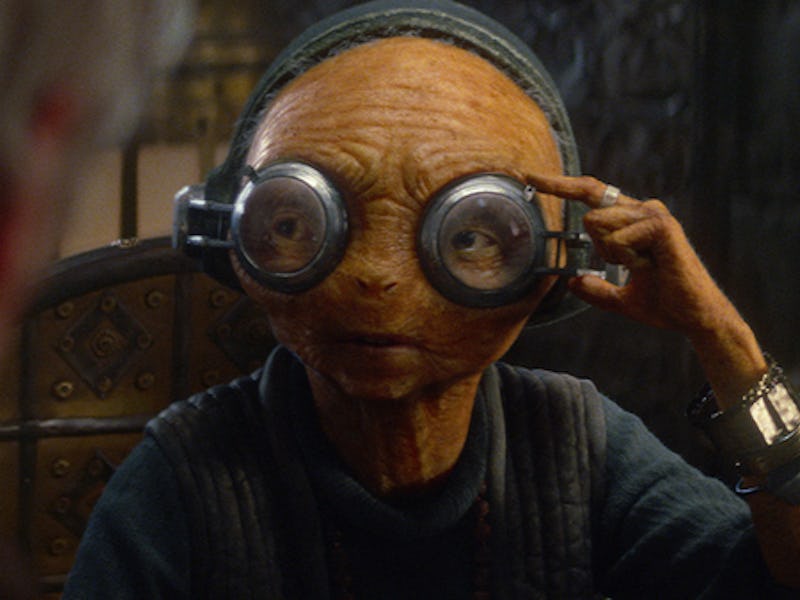New Force-Sensitive Characters Are Great for 'Star Wars'
How Maz Kanata and Chirrut Îmwe give us a better understanding of the Force.

The ability to use the Force used to be special. It was a mystical energy that gave power to Jedi, harnessed only after years of training. When Luke Skywalker joined up with old Ben Kenobi in A New Hope, the Jedi were nearly eradicated, making the Force more urban legend than anything. Of course, it always existed — it’s an energy field created by all living things, binding the galaxy together — but there were no more members of the special pseudo-religious order to fool people with mind tricks and fight with lightsabers.
Fast-forward 30 years, a corporate sale, and an injection of new lifeblood, and the Force is back in vogue. The life force reappeared in The Force Awakens, and despite some timeline eyebrow-raisers, it’ll continue with the upcoming movie Rogue One. Characters such Maz Kanata (Lupita Nyong’o) and Chirrut Îmwe (Donnie Yen) are being deemed “Force-sensitive,” which has allowed the Force to take on a whole new meaning.
Non-Jedi with Force leanings isn’t an entirely new idea. Leia discovered her sensitivity when she sensed that Vader told Luke a very big secret at the end of The Empire Strikes Back. She later sensed that Luke was safe, without any hard evidence, at the end of Return of the Jedi. Years later, she felt it again when her son Ben (aka Kylo Ren) killed her bae Han Solo on Starkiller Base in The Force Awakens.
Whereas Luke had enough power and training to control the Force and rise to the levels of a Jedi, Leia admitted to him in Return of the Jedi that, “You have a power I don’t understand and could never have.”
In the prequels, the Force was more prominent than ever, thanks to how many Jedi there were stomping around those three movies. There was even a science to it, with Midi-chlorian counts making The Force seemingly quantifiable.
As Lucasfilm Story Group head Pablo Hidalgo explained in a glorious Twitter rant about the Force, “The midi-prereq was to enter the prequel-era Jedi Order. It’s a rather soulless way to look at potential, by narrative design,” he tweeted. “The prequel Jedi have systemized their methods at the expense of spirituality and intuition. They are more ‘Order’ than ‘Jedi.’”
That the Extended Universe books and comics saw just about everyone — from people like the Witches of Dathomir to Jawas and Ewoks — claiming to be able to exert Force powers didn’t help, either.. This novel idea was even incorporated into video games, allowing characters to do things like accrue Force-sensitive points.
It allowed room to explore this convenient concept more in depth, but it suddenly became too easy to envision characters controlling this all-encompassing Force. Once upon a time (or, a long time ago, in a galaxy far far away), The Force was a mystical element that turned a farmboy into one of the most noble and powerful individuals in the galaxy; suddenly, it didn’t seem special at all. Who cares if you’re Force sensitive if a junk-dealing Jawa can be, too?
But it all became more focused, as did much of Star Wars lore, when Disney set its own canon rules. Gone was the EU excess, replaced by a more Force-appropriate balance of understanding the way the Force affected the saga’s supporting players.
The mystic Maz Kanata character in The Force Awakens is basically a modern Yoda proxy. But instead of being the most powerful Jedi in the galaxy, she’s a pirate and a smuggler who aware of the Force but unable to really wield it. The same goes for Chirrut Îmwe in Rogue One. He’s a monk-like Force-sensitive individual who can’t necessarily use any Jedi mind tricks on you, but he’s able to feel the power of the Force flowing through him. “All is as the Force will sit,” he says in the new film’s trailers.
This is significant because this level of non-Jedi Force sensitivity in non-Skywalker is something new, at least in terms of the movies. By using legitimate characters like Maz and Chirrut, we now have more egalitarian understanding of how the Force can influence others, without it becoming devalued. The Force is now a more robust and more inclusive idea that still has the aura of being reserved for the elite which isn’t very populist, but makes for a good movie.
As Hidalgo said in a very Jedi-like way at the end of his Twitter rant: “There’s more to the Force than just Jedi/Sith. There’s more to potential than midis. Just like there’s more to genius than grades.” The Force is finally and truly with all of us.